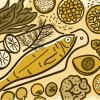Search

Seeking Allergy Relief
A change in season can brighten your days with vibrant new colors. But blooming flowers and falling leaves can usher in more than beautiful backdrops. Airborne substances that irritate your nose can blow in with the weather. When sneezing, itchy eyes, or a runny nose suddenly appears, allergies may be to blame. Allergies arise when the body’s [qtip:immune system|The body’s defense against germs…

Cancer Fact Sheets
NIH’s Cancer Fact Sheets answer common questions about more than 70 topics in cancer, including specific cancer types, prevention, detection, treatment, and possible causes. The fact sheets are available in English and Spanish. They are updated and revised based on the latest cancer research.

Plan Your Plate
What’s the eating style that’s best for health? Is it a Mediterranean eating plan? Vegetarian? Low carb? With all the eating styles out there, it’s hard to know which one to follow. Healthy eating is one of the best ways to prevent or delay health problems. Eating well, along with getting enough physical activity, can help you lower your risk of health problems like heart disease, diabetes,…, Limit Added Sugars, Added sugar is the extra sugar added to foods and drinks during preparation. Corn syrup, high-fructose corn syrup, brown sugar, and honey are examples of sweeteners added to foods and drinks, especially regular sodas. “The sugars present normally in milk and fruit are not considered added sugar,” explains Dr. Kimber Stanhope, a nutrition researcher at the University of California, Davis. Stanhope…, Consider Your Fats, Fat is high in calories and can increase your chances of developing obesity, heart disease, and other health problems. But there are different kinds of fats. Fats that are liquid at room temperature, or oils, are considered to be healthier than those that are solid. Solid fats are found in high amounts in beef, chicken, pork, cheese, butter, and whole milk. Solid fats have more saturated fats…, Check Labels for Salt, The Nutrition Facts label also shows salt, or sodium. Experts advise you to limit salt, which tends to be very high in processed foods. If you eat salty, highly processed food, you can quickly go over the daily limit of one teaspoon of salt (2,300 milligrams of sodium). Two hot dogs might have 900 milligrams of sodium. A can of ravioli might have 1400 milligrams. Other examples of salty, highly…, Make a Meal Plan, “Figuring out what to eat is less than half the battle,” Nicastro says. “Sticking to your plan is a bigger challenge. So that’s why it helps to be really prepared and plan ahead.” You’re much more likely to stick to your meal plan if you have healthy food that is ready to go. Some people find it helpful to prepare meals for the week in advance so that healthy food is within reach. The DASH eating…, Get Expert Advice, The Dietary Guidelines for Americans are designed to help people avoid developing obesity, diabetes, and heart disease. But everyone is different. You may have needs and risks that aren’t like the average American. Talk to your health care provider about your unique nutritional needs. “A great resource for someone to help you with your diet is a registered dietitian nutritionist, or RDN,”…

Safe Sleep for Baby
Did you know that babies should sleep on their back rather than their belly? Research has revealed many risk factors for sudden infant death, and sleep position is the most important one. Each year in the U.S., about 3,500 infants die suddenly and unexpectedly in their sleep. In about half of these deaths, doctors can’t find a medical reason to explain why, even after a complete review. When the…

Probiotic May Stop Staph
A new study suggests that people who have a certain helpful microbe, or probiotic, in their gut may be less likely to have harmful “staph” germs. Staph is short for, Staphylococcus aureus, . It’s a very common germ. Staph usually doesn’t cause problems. But it can cause boils, pneumonia, and other infections. Antibiotics usually cure staph infections. But some staph germs are resistant to treatment. These infections can be deadly. NIH-funded researchers have been studying whether probiotics can help prevent staph infections., Bacillus, bacteria are often found in probiotic products., Bacillus, are found on vegetables harvested from the ground. Researchers examined the bacteria in 200 stool samples from people who live in rural Thailand, where people are more likely to eat fresh vegetables. About half the samples contained, Bacillus, . Many of the people studied had staph. But no staph was found in any of the people with, Bacillus, . In laboratory tests, the researchers found that, Bacillus, makes specific substances that stop staph from thriving. When they gave mice a probiotic product that contained, Bacillus, , staph didn’t grow in the gut. “Probiotics frequently are recommended as dietary supplements to improve digestive health,” says Dr. Anthony S. Fauci, director of NIH’s National Institute of Allergy and Infectious Diseases. “This is one of the first studies to describe precisely how they may work to provide health benefits.” However, more studies are needed to test whether a probiotic product with, Bacillus, could prevent the growth of staph in people.

Inspire Others to Move More and Eat Better
More than two of every three adults carry excess weight. Overweight and obesity increase the risk of diabetes, kidney disease, heart disease, and other health problems. Communities across the country need help. Some black women have a high risk of being overweight. The “Sisters Together” program was developed by NIH and other experts, along with black women in the Boston area who volunteered to…

Personal Stories
Have you ever wondered who takes part in clinical research studies? Clinical research is medical research that involves people just like you. Hear personal stories from volunteers and researchers who are helping others and moving science forward.
Shake it Off
Have you ever had a bad mood you just couldn’t shake? Everyone feels grouchy or irritable some days. But a bad mood or major mood swings that go on too long may signal a bigger problem. The good news is that certain healthy habits can help you boost your mood. “Some people are more moody than other people. Normal mood actually varies from person to person,” explains Dr. Carlos Zarate, chief of…, Changing Moods, It’s not only temperament that affects how you feel each day. Daily habits that affect your ability to manage stress—like diet, exercise, sleep, or how much alcohol you drink—play an important role, too. “If you address those factors—have good diet, good exercise, good sleep-wake habits, regular activities, routines, and try to disconnect from work and other stressors—those do have beneficial…, Bouncing Back, “Mood is a normal part of life, and having emotions is a normal part of life,” Kovacs says. “Sometimes you feel more negative than other times. That’s not necessarily bad.” Kovacs studies the strategies people use to repair their mood when feeling down. Her team and others have shown that what you do when feeling down can boost your mood or spiral you into feeling worse. “One of the most common…, Keeping Track, Charting your moods can help you figure out what’s affecting how you feel. There are even apps that help. Dr. David C. Mohr, who studies technology-based mental health interventions at Northwestern University, has found that people want to do more than just track their moods using apps. They want to see how their activities and moods are related, to help them take action to feel better. “That…

Managing Multiple Sclerosis
Most of the time, multiple sclerosis, or MS, starts mildly, with unpredictable symptoms that can seem baffling. Without treatment, the disease can worsen to the point that you can’t write, speak, or walk. MS starts when the body’s [qtip:immune system|The system that protects your body from microscopic threats.] slowly attacks the fatty coating around nerves. Without an intact coating,…

Certain Ovarian Cysts May Not Need Monitoring
When women experience pelvic pain and abnormal bleeding, doctors can use ultrasound imaging to help find the cause. These scans often also find growths in the ovaries. The most common type, called a simple cyst, isn’t usually harmful. But because of concerns about ovarian cancer, doctors may monitor a cyst with imaging over many years. Some women even undergo surgery to determine whether a cyst…
NIH Office of Communications and Public Liaison
Health and Science Publications Branch
Building 31, Room 5B52
Bethesda, MD 20892-2094
Contact Us:
nihnewsinhealth@od.nih.gov
Phone: 301-451-8224
Share Our Materials: Reprint our articles and illustrations in your own publication. Our material is not copyrighted. Please acknowledge NIH News in Health as the source and send us a copy.
For more consumer health news and information, visit health.nih.gov.
For wellness toolkits, visit www.nih.gov/wellnesstoolkits.
